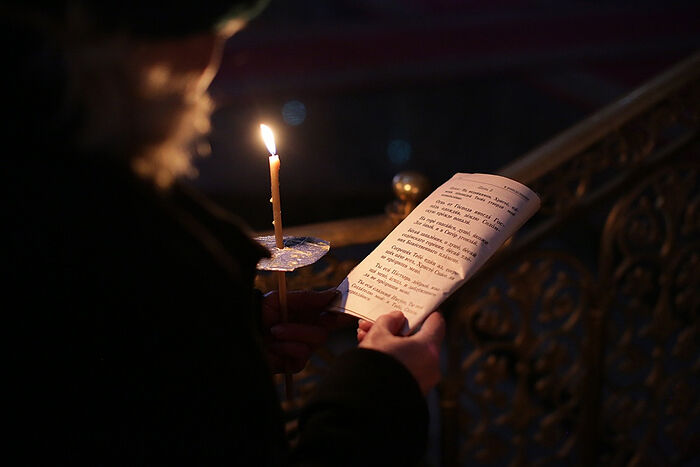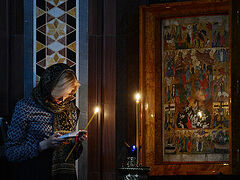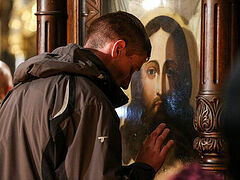O ye faithful, with joy let us enter upon the beginning of the Fast.
Let us not be of sad countenance, but let us wash our faces in the water of dispassion .
(Monday of the First Week, Matins Canon, Ode 8)
A great undertaking also requires great preparation; a difficult work also requires many tools. The arena of the Holy Forty Days that lies before us, which the holy Church has now led us to as a special arena for imitating the forty-day fast of the Savior, as a feat of the intentional purification of the soul, is truly not a minor labor, not work that is easy for our infirmity.
Therefore, the holy Church, as a wise teacher, has been preparing us for this labor for a while. It has prepared us over the course of the four preceding weeks with the most instructive examples and prescriptions. It has prepared us for the humble path of Christ by the humbling of arrogant, pharisaic self-justification and the justification of the humble publican’s self-condemnation.
It has prepared us to return to the Heavenly Father by the most comforting example of the return of the prodigal son, who, due to the frivolity of youth, left his father’s house, squandered everything he’d received with riotous living, descended to the lowest state of humiliation, and in a sense of despair but with hope in the forgiveness of the father, again returned to his father’s house, and by the boundless goodness of his father, received all his former rights, all the precious advantages of a son.
The Church has prepared us to walk in fear and trembling before God by placing before our eyes the Dread Judgment, which will decide our fate of eternal blessedness or suffering according to our deeds. Finally, to arouse in us a godly sorrow for the blessedness we have lost and to inflame zeal for its return, it filled us on the last day with the most sorrowful memory of the expulsion of our forefathers from the Paradise of sweetness for transgressing the commandment of God. They preferred the cunning seduction of the serpent, and this transgression is on all of us, the descendants of Adam, as a natural inheritance, which is passed on and weighs us down with all the consequences of the curse.
Thus, the holy Church, having prepared us for the holy arena of fasting, as the sick for healing, as vagrants for the right path, as the overwhelmed for peaceful refuge, has now opened to us the door and entrance, has already placed us in the very arena of fasting, to lead us in peace to our intended aim.
What’s that? With what feelings, with what kind of disposition must we enter into the arena before us? With feelings of sorrow, with a despondent disposition? No! Let us enter the ascetic endeavor before us with a feeling of spiritual happiness, with a disposition of spiritual rejoicing: “With joy let us enter upon the beginning of the Fast.”
And this feeling won’t wane within us if we look at the endeavor before us as the true path to our spiritual perfection, which is what the Lenten labor is for us. And what is there in the true spirit of fasting? Nothing other than the perfect bringing of ourselves to a well-ordered state, the bringing of all the forces of our being into a peaceful, harmonious work. True fasting is the purification of the body, the enlightenment of the soul, the sanctification of the spirit; it is the subjugation of the senses to the mind, of the mind to the spirit, and the spirit to the Spirit of God. True fasting is the ordering of our body into a temple of God, the ordering of the soul into a sanctuary of the blessed gifts of the Holy Spirit—truth, righteousness, holiness; the ordering of our spirit into one spirit with the Lord, that the Spirit of Christ might be able to work in us both to will and to do of His good pleasure (Phil. 2:13), and that we might live not for ourselves, but for Him Who died for us and rose again.
In a word: true fasting is the good ordering of ourselves by blessed temperance and prayerful purification into a state of spiritual perfection, where we are lead into the Eden of rightness of mind, purity of heart, uprightness of life; where we hear not the formidable voice of God the Judge, but the sweet voice of God the Father, the meek word of the Son, and the quiet breathing of the Holy Spirit drawing us into love for Himself; and by this blessed pull, calling us to serve the LORD with fear and rejoice in Him with trembling (Ps. 2:11).
Do we love life? Do we desire true health of body, purity of soul, and sanctification of spirit? Let us look at fasting as a sacred and at the same time necessary means for putting on the Divinely radiant garment of primeval purity and chastity, and the Fast will appear to us as an angel of light, with a welcoming look of joy, to lead us into the spiritual paradise and indicate the path to the door of life—the Fast will appear to us as something desired and pleasurable for our spirit!
Of course, fasting isn’t entirely pleasant for our outer man, born of flesh and blood and according to the lust of the eyes, and the pride of life (1 Jn. 2:16), who lives and acts in us. Fasting for the abstinence of the body requires the restraint of the senses in external pleasures. It’s hard for the lust of the flesh. Fasting for the purification of the soul requires the unceasing taming of vain thoughts, desires, and aspirations. It’s tormenting for the lust of the eyes, which want to see everything, know everything, do everything their own way, and succeed in everything in their own way. The Fast requires us to humble ourselves in everything and before everyone, always and everywhere, externally and internally, in words and thoughts. It’s contrary to our pride of life. And therefore, the Fast is unpleasant for our old, “natural” man.1
But that’s why we have this time—that we might labor. That’s why we have this path of the Fast—that we might run. We fast in order to crucify the flesh with its lust and passions, to subject the flesh to the mind, the mind to the purified, grace-filled spirit, and our spirit to the Spirit of God and Christ. Labors bring peace, ascetic endeavors—glory, patience—perfection, fidelity in endeavors—a crown from Christ and blessed, sincere communion with Him and love. And what could be higher, sweeter, more desirable? It’s pleasant to labor out of love for our beloved. And for love—especially spiritual, Heavenly, Divine love—nothing is difficult.
This pledge of love is expected and required, and even lovingly entreated of us by Christ—the Divine lover of our souls!
And so let us enter, by the grace of God, into the labor of fasting as into a labor of spiritual perfection, into the joy of the spirit, and into the strength of love—into love for God the Father, Who gave His Only-Begotten Son for us; into love for God the Son, Who loved us unto death, even the death on the cross; into love for God the Holy Spirit, Who ceaselessly arouses our hearts with unspoken breaths of love, to deliver us from the bondage of corruption into the glorious liberty of the children of God (Rom. 8:21).
Finally, let us enter in pure, holy, quiet, peaceful love for one another. It’s good to labor in collective love; it’s easy to labor for the God of love in mutual love; it’s comforting to labor in a single spirit of love to prosper in Divine love. Therefore, may everything in the field of peace and silence be for us, as the Apostle says, in peace, gentleness, and love (cf. 1 Cor. 16:14).
Thus, marching along this holy path in vigor and collectedness of spirit, marching in peace, oneness of mind, and loving patience with one another, we will not only not be burdened by the time of the holy Fast, but we will desire that this holy time pass quietly and peacefully, that we might use it to exercise ourselves in abstinence, meekness, kindness, and prayer as much as possible; that we might use it in righteousness of spirit and purity of intentions, and to fulfill all our necessary and useful daily affairs and endeavors.
Amen.




